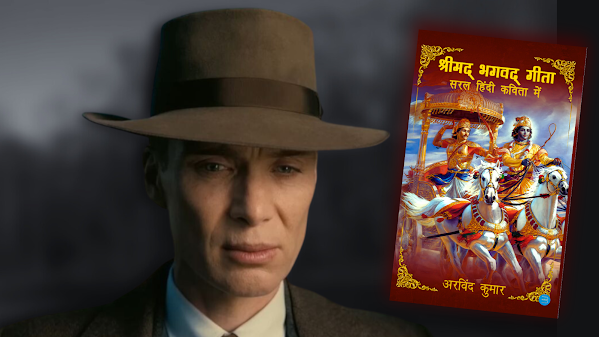Bhagavad Gita : Oppenheimer and Cillian Murphy
Oppenheimer and Cillian Murphy Discuss the Bhagavad Gita
Introduction
The Bhagavad Gita, a sacred Hindu scripture, has fascinated countless individuals throughout history. Its profound teachings on life, purpose, and spirituality have attracted scholars, philosophers, and even celebrities. In this article, we delve into an intriguing conversation between two notable figures: J. Robert Oppenheimer, the renowned physicist, and Cillian Murphy, the acclaimed actor. Together, they explore the timeless wisdom encapsulated within the Bhagavad Gita and reflect on its relevance in our modern world.
Table of Contents
1. The Significance of the Bhagavad Gita
2. J. Robert Oppenheimer's Encounter with the Bhagavad Gita
3. Cillian Murphy's Perspective on the Bhagavad Gita
4. Extracting Life Lessons from the Bhagavad Gita
5. Applying the Teachings in Today's World
6. The Universal Appeal of the Bhagavad Gita
7. The Influence of the Bhagavad Gita on Oppenheimer and Murphy
8. Conclusion
The Significance of the Bhagavad Gita
The Bhagavad Gita, often referred to as the Gita, holds immense significance within Hindu philosophy. It is a 700-verse scripture that forms a part of the Indian epic, the Mahabharata. The Gita is a conversation between Prince Arjuna and Lord Krishna, where profound insights and teachings are imparted. It covers a wide range of topics, including duty, righteousness, devotion, and the nature of the self.
J. Robert Oppenheimer's Encounter with the Bhagavad Gita
J. Robert Oppenheimer, one of the key figures behind the development of the atomic bomb, had a life-altering encounter with the Bhagavad Gita. During his time as the director of the Manhattan Project, Oppenheimer came across a particular verse that deeply resonated with him. The verse, which spoke of the destructive power of the universe, led Oppenheimer to famously quote from the Gita after witnessing the first successful test of the atomic bomb, saying, "Now I am become Death, the destroyer of worlds."
Cillian Murphy's Perspective on the Bhagavad Gita
Cillian Murphy, a versatile actor known for his captivating performances, has also been captivated by the Bhagavad Gita. In an interview, Murphy expressed his fascination with the Gita's profound teachings on the human condition and the pursuit of self-realization. He highlighted the Gita's emphasis on selfless action, inner peace, and the eternal nature of the soul as concepts that deeply resonate with him.
Extracting Life Lessons from the Bhagavad Gita
The Bhagavad Gita provides valuable insights into various aspects of life. Its teachings guide individuals on how to navigate challenges, make ethical choices, and live a purposeful existence. Some of the key lessons include the importance of fulfilling one's duty without attachment to outcomes, embracing resilience in the face of adversity, and cultivating equanimity amidst the ever-changing circumstances of life.
Applying the Teachings in Today's World
The timeless wisdom of the Bhagavad Gita is not confined to the past. Its teachings continue to offer guidance in the present era. In today's fast-paced and interconnected world, the Gita's emphasis on mindfulness, self-awareness, and the pursuit of inner fulfillment holds particular relevance. By incorporating its principles, individuals can lead more balanced lives and find meaning in their actions.
The Universal Appeal of the Bhagavad Gita
The universal appeal of the Bhagavad Gita lies in its ability to transcend religious and cultural boundaries. Its teachings address fundamental questions about existence, ethics, and the nature of reality, making it accessible to people from all walks of life. Whether one follows Hinduism or not, the Gita's wisdom has the power to inspire and transform individuals on their personal journeys.
The Influence of the Bhagavad Gita on Oppenheimer and Murphy
For both J. Robert Oppenheimer and Cillian Murphy, the Bhagavad Gita has left a lasting impact. Oppenheimer's encounter with the Gita challenged his understanding of power and its consequences, prompting deep introspection. Murphy, on the other hand, finds solace and inspiration in the Gita's teachings, applying its principles to his craft and personal life. Both individuals recognize the Gita as a source of profound wisdom and guidance.
Conclusion
The Bhagavad Gita's teachings continue to resonate with individuals across different fields and walks of life. From renowned physicist J. Robert Oppenheimer to acclaimed actor Cillian Murphy, its timeless wisdom has captivated hearts and minds. By exploring its lessons on duty, self-realization, and resilience, we can gain valuable insights and find greater meaning in our own lives.
FAQs
1. Is the Bhagavad Gita only relevant to Hindus?
No, the Bhagavad Gita's teachings are universal and can be appreciated by people of all faiths or even those without religious affiliations. Its wisdom transcends cultural and religious boundaries.
2. How long is the Bhagavad Gita?
The Bhagavad Gita consists of 700 verses, divided into 18 chapters. It is relatively concise but packed with profound teachings.
3. Are there any translations of the Bhagavad Gita available in English?
Yes, there are numerous translations of the Bhagavad Gita available in English, allowing readers from different backgrounds to access its teachings.
4. Can the Bhagavad Gita be applied in modern-day life?
Absolutely. The Bhagavad Gita's teachings hold relevance in today's world, offering guidance on personal growth, ethical decision-making, and finding inner peace.
5. What are some other famous quotes from the Bhagavad Gita?
Apart from J. Robert Oppenheimer's quote, "Now I am become Death, the destroyer of worlds," other notable quotes include "Yoga is the journey of the self, through the self, to the self" and "Change is the law of the universe. You can be a millionaire or a pauper in an instant." These quotes reflect the profound insights contained within the scripture.




Comments
Post a Comment